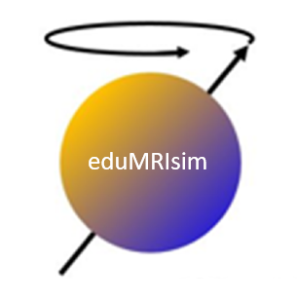Educational MRI simulator – eduMRIsim
About eduMRIsim: Magnetic resonance imaging (MRI) is a very powerful and flexible medical imaging technique, capable of detailed visualization of human organs, blood vessels, and musculoskeletal structures. It is increasingly being used in clinical practice to support the diagnosis of a wide range of diseases, including tumors, cardiovascular disease, musculoskeletal disorders and a variety of brain diseases, such as dementia, depression, cerebral hemorrhage and stroke.
MRI is a very complex imaging modality to understand. It is described by complex physics, which formulates the many ways in which hydrogen spins in our bodies can be excited by electromagnetic waves in a strong magnetic field, and which describes how the relaxation of those spins can be measured and translated into images.
MRI education consists largely of lectures, with little or no opportunity to gain experience with a real MRI scanner. A realistic software MRI simulator could offer a solution here. It would enable students to gain practical understanding and experience of the multiple aspects of MRI (scan planning, scan parameter selection, actual scanning, image reconstruction, image enhancement). The eduMRIsim project aims to develop an advanced, flexible, clinically realistic, open-source educational software MRI simulator, that will enable students – via challenge-based learning – to experience the practical aspects of MRI, in connection to the MRI theory communicated via lectures. The currently used clinical as well as newer research-oriented scan methods will be incorporated. The project will build on the experiences gained in the EU Marie Curie openGTN project. The project is funded by StITpro and by the TU Eindhoven (TU/e) Education Innovation Fund and is a cooperation between the TU/e departments of Biomedical Engineering and Electrical Engineering.
